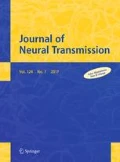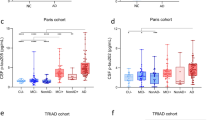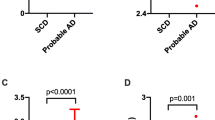Abstract
Alzheimer’s disease (AD) is a progressive neurodegenerative disorder characterized by the presence of extracellular amyloid plaques (senile plaques) and intracellular neurofibrillary tangles formed by hyperphosphorylated tau protein. This process leads to neuronal degradation and neuronal death. Phosphorylation of tau protein at threonine 231 (p-tau231) has been shown to be characteristic in post-mortem brain tissue of patients with AD and it can be sensitively detected in cerebrospinal fluid (CSF). Therefore, it may serve as a biomarker to support the diagnosis of AD. In this study, we analysed how well p-tau231 could differentiate between patients suffering from dementia either due or not due to AD by a sandwich enzyme immunoassay. CSF p-tau231 was significantly higher in patients with dementia due to AD than in those with dementia due to other causes. In addition, we studied different factors affecting p-tau231 levels in CSF. We found that apolipoprotein E genotype influences p-tau231 CSF levels. Gender and age did not affect p-tau231 levels in CSF. Our findings indicate that p-tau231 levels in CSF can be a valuable marker for the clinical diagnosis of AD.





Similar content being viewed by others
References
Alzheimer’s Association (2018) 2018 Alzheimer’s disease facts and figures. Alzheimer’s Dement 14:367–429. https://doi.org/10.1016/j.jalz.2018.02.001
Arendt T, Stieler JT, Holzer M (2016) Tau and tauopathies. Brain Res Bull 126:238–292
Augustinack JC, Schneider A, Mandelkow EM, Hyman BT (2002) Specific tau phosphorylation sites correlate with severity of neuronal cytopathology in Alzheimer’s disease. Acta Neuropathol 103:26–35. https://doi.org/10.1007/s004010100423
Ballard C, Gauthier S, Corbett A et al (2011) Alzheimer’s disease. Lancet 377:1019–1031. https://doi.org/10.1016/S0140-6736(10)61349-9
Blennow K, Hampel H (2003) CSF markers for incipient Alzheimer’s disease. Lancet Neurol 2:605–613
Blennow K, Wallin A, Ågren H et al (1995) tau protein in cerebrospinal fluid—a biochemical marker for axonal degeneration in Alzheimer disease? Mol Chem Neuropathol 26:231–245. https://doi.org/10.1007/BF02815140
Blennow K, Vanmechelen E, Hampel H (2001) CSF total tau, Aβ42 and phosphorylated tau protein as biomarkers for Alzheimer’s disease. Mol Neurobiol 24:87–97. https://doi.org/10.1385/MN:24:1-3:087
Blennow K, Hampel H, Weiner M, Zetterberg H (2010) Cerebrospinal fluid and plasma biomarkers in Alzheimer disease. Nat Rev Neurol 6:131–144
Braak H, Braak E (1997) Frequency of stages of alzheimer-related lesions in different age categories. Neurobiol Aging 18:351–357. https://doi.org/10.1016/S0197-4580(97)00056-0
Buerger K, Teipel SJ, Zinkowski R et al (2002a) CSF tau protein phosphorylated at threonine 231 correlates with cognitive decline in MCI subjects. Neurology 59:627–629. https://doi.org/10.1212/WNL.59.4.627
Buerger K, Zinkowski R, Teipel SJ et al (2002b) Differential diagnosis of Alzheimer disease with cerebrospinal fluid levels of tau protein phosphorylated at threonine 231. Arch Neurol 59:1267–1272. https://doi.org/10.1001/archneur.59.8.1267
Buerger K, Ewers M, Pirttilä T et al (2006) CSF phosphorylated tau protein correlates with neocortical neurofibrillary pathology in Alzheimer’s disease. Brain 129:3035–3041. https://doi.org/10.1093/brain/awl269
Buerger K, Alafuzoff I, Ewers M et al (2007) No correlation between CSF tau protein phosphorylated at threonine 181 with neocortical neurofibrillary pathology in Alzheimer’s disease. Brain 130:e82. https://doi.org/10.1093/brain/awm140
Cho JH, Johnson GVW (2003) Glycogen synthase kinase 3β phosphorylates tau at both primed and unprimed sites: Differential impact on microtubule binding. J Biol Chem 278:187–193. https://doi.org/10.1074/jbc.M206236200
Davies P, Resnick J, Resnick B et al (1998) Consensus report of the working group on: “Molecular and biochemical markers of Alzheimer’s disease.” In: Neurobiology of Aging. pp 109–116
Deuschl G, Maier WS (2017) S3-Leitlinie “Demenzen”, http://www.dgn.org/leitlinien, posted 25 Januar 2016, Accessed 29 November 2017. In: Deuschl G, Maier W S3-leitlin. Demenzen. Dtsch. Gesellschaft für Neurol. Hrsg. Leitlinien für Diagnostik und Ther. der Neurol. http://tinyurl.com/hkwk6lf. Accessed 29 Nov 2017
Goedert M, Jakes R, Crowther RA et al (1994) Epitope mapping of monoclonal antibodies to the paired helical filaments of Alzheimer’s disease: identification of phosphorylation sites in tau protein. Biochem J 301:871–877. https://doi.org/10.1042/bj3010871
Hampel H, Bürger K, Pruessner JC et al (2005) Correlation of cerebrospinal fluid levels of tau protein phosphorylated at threonine 231 with rates of hippocampal atrophy in Alzheimer disease. Arch Neurol 62:770–773. https://doi.org/10.1001/archneur.62.5.770
Humpel C (2011) Identifying and validating biomarkers for Alzheimer’s disease. Trends Biotechnol 29:26–32
Ishiguro K, Ohno H, Arai H et al (1999) Phosphorylated tau in human cerebrospinal fluid is a diagnostic marker for Alzheimer’s disease. Neurosci Lett 270:91–94. https://doi.org/10.1016/S0304-3940(99)00476-0
Jack CR, Bennett DA, Blennow K et al (2018) NIA-AA Research Framework: Toward a biological definition of Alzheimer’s disease. Alzheimer’s Dement 14:535–562
Kiđemet-Piskač S, Babić Leko M, Blažeković A et al (2018) Evaluation of cerebrospinal fluid phosphorylated tau231 as a biomarker in the differential diagnosis of Alzheimer’s disease and vascular dementia. CNS Neurosci Ther 24:734–740. https://doi.org/10.1111/cns.12814
Klafki H-W, Hafermann H, Bauer C et al (2016) Validation of a commercial chemiluminescence immunoassay for the simultaneous measurement of three different amyloid-β peptides in human cerebrospinal fluid and application to a clinical cohort. J Alzheimer’s Dis 54:691–705. https://doi.org/10.3233/JAD-160398
Kohnken R, Buerger K, Zinkowski R et al (2000) Detection of tau phosphorylated at threonine 231 in cerebrospinal fluid of Alzheimer’s disease patients. Neurosci Lett 287:187–190
McKhann GM, Knopman DS, Chertkow H et al (2011) The diagnosis of dementia due to Alzheimer’s disease: Recommendations from the National Institute on Aging-Alzheimer’s Association workgroups on diagnostic guidelines for Alzheimer’s disease. Alzheimer’s Dement 7:263–269. https://doi.org/10.1016/j.jalz.2011.03.005
Nordberg A, Rinne JO, Kadir A, Lngström B (2010) The use of PET in Alzheimer disease. Nat Rev Neurol 6:78–87
Olsson B, Lautner R, Andreasson U et al (2016) CSF and blood biomarkers for the diagnosis of Alzheimer’s disease: a systematic review and meta-analysis. Lancet Neurol 15:673–684. https://doi.org/10.1016/S1474-4422(16)00070-3
Park M, Moon WJ (2016) Structural MR imaging in the diagnosis of Alzheimer’s disease and other neurodegenerative dementia: Current imaging approach and future perspectives. Korean J Radiol 17:827–845
Robin X, Turck N, Hainard A et al (2011) pROC: an open-source package for R and S + to analyze and compare ROC curves. BMC Bioinform 12:77. https://doi.org/10.1186/1471-2105-12-77
Shahpasand-Kroner H, Klafki H, Bauer C et al (2018) A two-step immunoassay for the simultaneous assessment of Aβ38, Aβ40 and Aβ42 in human blood plasma supports the Aβ42/Aβ40 ratio as a promising biomarker candidate of Alzheimer’s disease. Alzheimers Res Ther 10:121. https://doi.org/10.1186/s13195-018-0448-x
Spiegel J, Pirraglia E, Osorio RS et al (2015) Greater specificity for cerebrospinal fluid P-tau231 over P-tau181 in the differentiation of healthy controls from Alzheimer’s Disease. J Alzheimer’s Dis 49:93–100. https://doi.org/10.3233/JAD-150167
Vogelgsang J, Shahpasand-Kroner H, Vogelgsang R et al (2018) Multiplex immunoassay measurement of amyloid-β42 to amyloid-β40 ratio in plasma discriminates between dementia due to Alzheimer’s disease and dementia not due to Alzheimer’s disease. Exp Brain Res 236:1241–1250. https://doi.org/10.1007/s00221-018-5210-x
Williams DR (2006) Tauopathies: classification and clinical update on neurodegenerative diseases associated with microtubule-associated protein tau. Intern Med J 36:652–660
Zetterberg H, Wahlund LO, Blennow K (2003) Cerebrospinal fluid markers for prediction of Alzheimer’s disease. Neurosci Lett 352:67–69. https://doi.org/10.1016/j.neulet.2003.08.011
Acknowledgements
We thank Ulrike Heinze and Anke Jahn-Brodmann for the processing of biomaterial and their support with the assay performance and Prof. Dr. Oliver Wirths for performing the ApoE genotyping. Prof. Jens Wiltfang is supported by an Ilídio Pinho professorship. This study has been supported by the following grants from Instituto de Biomedicina (iBiMED) UID/BIM/04501/2013 and PTDC/DTP_PIC/5587/2014, Fundação para a Ciência e Tecnologia of the Ministério da Educação e Ciência, COMPETE program, the QREN and the European Union (Fundo Europeu de Desenvolvimento Regional).
Author information
Authors and Affiliations
Corresponding author
Ethics declarations
Conflict of interest
IL and KW are employees of AJ Roboscreen GmbH. All other authors declare no conflict of interests.
Ethical approval
All procedures performed in studies involving human participants are in accordance with the ethical standards of the institutional and/or national research committee and with the 1964 Helsinki declaration and its later amendments or comparable ethical standards.
Informed consent
All individual participants gave their informed consent prior to the inclusion into this study.
Additional information
Publisher’s Note
Springer Nature remains neutral with regard to jurisdictional claims in published maps and institutional affiliations.
Rights and permissions
About this article
Cite this article
Santos, J.R.F., Bauer, C., Schuchhardt, J. et al. Validation of a prototype tau Thr231 phosphorylation CSF ELISA as a potential biomarker for Alzheimer’s disease. J Neural Transm 126, 339–348 (2019). https://doi.org/10.1007/s00702-019-01982-5
Received:
Accepted:
Published:
Issue Date:
DOI: https://doi.org/10.1007/s00702-019-01982-5




